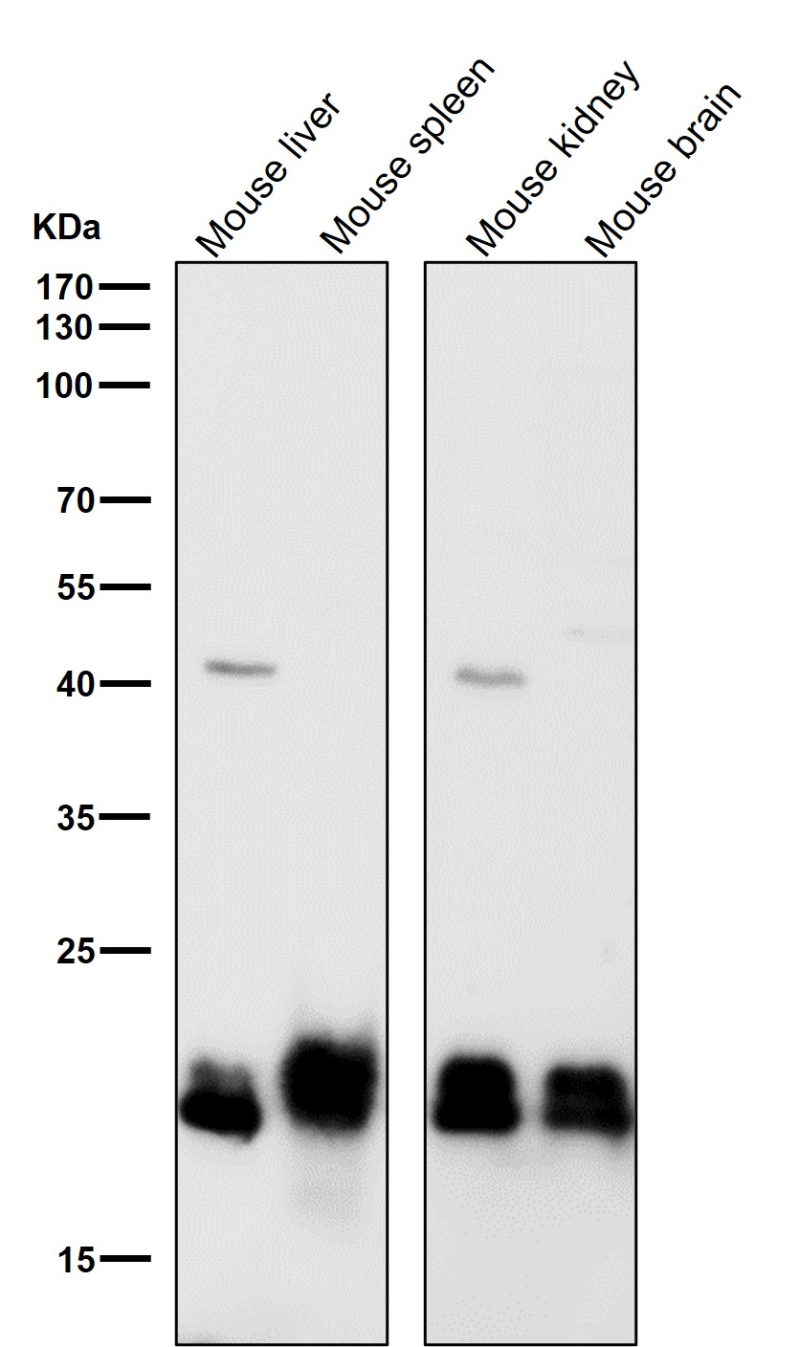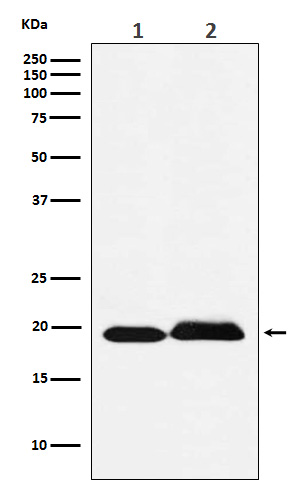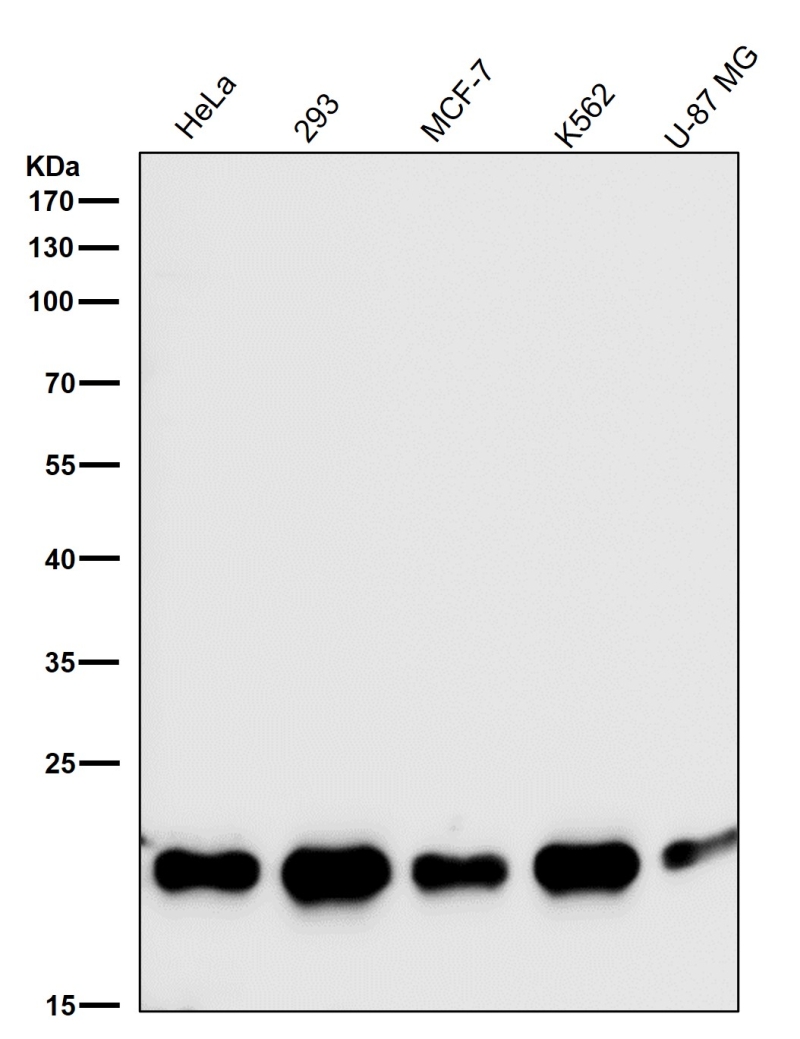


| WB | 咨询技术 | Human,Mouse,Rat |
| IF | 咨询技术 | Human,Mouse,Rat |
| IHC | IHC:1/100-1/200;IHF:1/50-1/200 | Human,Mouse,Rat |
| ICC | 1/50-1/200 | Human,Mouse,Rat |
| FCM | 1/20-1/100 | Human,Mouse,Rat |
| Elisa | 咨询技术 | Human,Mouse,Rat |
| Aliases | Splicing factor; SRp20; SRSF3; X16;;SRSF3 |
| WB Predicted band size | 19 kDa |
| Host/Isotype | Rabbit IgG |
| Antibody Type | Primary antibody |
| Storage | Store at 4°C short term. Aliquot and store at -20°C long term. Avoid freeze/thaw cycles. |
| Species Reactivity | Human,Mouse,Rat |
| Immunogen | A synthesized peptide derived from human SRSF3 |
| Formulation | Purified antibody in PBS with 0.05% sodium azide,0.05% BSA and 50% glycerol. |
+ +
以下是关于SRSF3抗体的参考文献示例(内容为模拟生成,仅供参考):
---
1. **文献名称**: *SRSF3 promotes hepatocellular carcinoma progression by regulating alternative splicing of oncogenic transcripts*
**作者**: Li, X., Wang, Y., & Zhang, J.
**摘要**: 本研究揭示SRSF3在肝细胞癌中高表达,通过调控致癌基因(如MYC)的可变剪接促进肿瘤生长。实验采用SRSF3抗体进行免疫印迹(Western blot)和免疫组织化学(IHC),证实其与患者预后不良相关。
2. **文献名称**: *SRSF3 modulates viral RNA sensing and interferon response during RNA virus infection*
**作者**: Chen, L., Wei, T., & Zhou, D.
**摘要**: 研究探讨SRSF3在RNA病毒(如流感病毒)感染中的作用,发现其通过结合病毒RNA抑制干扰素通路。使用SRSF3抗体进行免疫共沉淀(Co-IP)和荧光显微镜观察,揭示了其在胞浆中的动态定位。
3. **文献名称**: *Loss of SRSF3 triggers p53-dependent apoptosis via aberrant splicing of DNA damage repair genes*
**作者**: Kim, H., Lee, S., & Park, M.
**摘要**: 文章证明敲低SRSF3导致DNA修复基因剪接错误,激活p53依赖性凋亡。通过SRSF3抗体进行染色质免疫沉淀测序(ChIP-seq)和流式细胞术,阐明了其在基因组稳定性中的关键作用。
4. **文献名称**: *SRSF3 antibody characterization for specificity validation in murine models*
**作者**: Smith, R., Brown, K., & Johnson, A.
**摘要**: 该文献系统验证了多种商业SRSF3抗体的特异性,通过敲除细胞系对比Western blot和免疫荧光结果,为后续研究提供了抗体选择指南。
---
(注:以上文献为示例性内容,实际引用请通过学术数据库检索确认。)
SRSF3 (Serine/arginine-rich splicing factor 3), also known as SRp20. is a member of the serine/arginine (SR) protein family, which plays critical roles in constitutive and alternative RNA splicing. As a key splicing regulator, SRSF3 binds to pre-mRNA through its RNA recognition motif (RRM) and RS domain, facilitating spliceosome assembly and regulating splice site selection. It is involved in diverse cellular processes, including cell cycle progression, apoptosis, differentiation, and stress responses. Dysregulation of SRSF3 has been linked to cancers, viral infections, and neurological disorders, making it a focus of biomedical research.
SRSF3 antibodies are essential tools for detecting and characterizing this protein in experimental settings. These antibodies, typically raised in rabbits or mice against specific epitopes (e.g., full-length protein or conserved domains), are widely used in techniques such as Western blotting, immunohistochemistry (IHC), immunoprecipitation (IP), and immunofluorescence (IF). High-quality SRSF3 antibodies exhibit specificity validated via knockout cell lines or siRNA-mediated depletion controls. Researchers employ them to study SRSF3's expression patterns, subcellular localization (predominantly nuclear), and dynamic post-translational modifications (e.g., phosphorylation) under varying physiological or pathological conditions. Commercial SRSF3 antibodies often include validation data across multiple applications to ensure reproducibility in studies exploring splicing mechanisms, gene expression regulation, or disease-associated splicing anomalies.
×